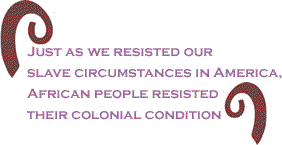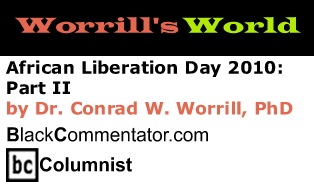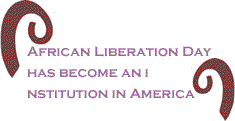
|
||||||||||||||||||||||
|
||
 |
||
This is the second of a two part series discussing the origin and development of African Liberation Day. The month of May is very important in the worldwide African Liberation Movement. During this month, throughout the African world Community, African Liberation Day (ALD) is celebrated. It
is important that African Liberation Day be a vehicle to continue
to highlight the problems, challenges and the future of African
people everywhere. The challenges facing Africa and African people
worldwide require that we remain dedicated to the cause of The
colonial period in Africa, as well as the enslavement of African
people who were captured and brought to North America, had a devastating
impact on African
people did not sit idly by. Just as we resisted our slave circumstances
in African people began waging a battle to reclaim their lands. This has been a long and bitter struggle. Resistance to white supremacy and colonial domination took many shapes and forms.
It
was not until the early 1950s that the first African country gained
political independence in the movement to reclaim This independence movement sparked an onslaught of African people reclaiming their territories and led to the formation of the Organization of African Unity (OAU) in May 1963. (This is why we celebrate ALD in May.) It was during this period that Malcolm X linked the struggle of African people in this country with the struggle of African people worldwide. It
is interesting to note that the Civil Rights Movement in this country
was sparked in
African
Liberation Day is a day when all Black people should come together.
As I have emphasized many times before, whether you were born in
Ghana, Nigeria, Kenya, Ethiopia, South Africa, Mozambique, Zimbabwe,
Jamaica, Belize, Bahia, Germany, England, France, Alabama, Georgia,
or on 47th Street in Chicago, as long as you are Black, you are
an African with a common heritage and a common set of conditions.
We must continue to fight against racism and white supremacy as
we demand reparations for African people in
|
||
If you would like to comment on this article, please do so below. There is a 400 character limit. You do not need a FaceBook account. Your comment will be posted here on BC instantly. Thanks. Entering your email address is not mandatory. You may also choose to enter only your first name and your location.
|
||
Thank you very much for your readership. |
||
| Any BlackCommentator.com article may be re-printed so long as it is re-printed in its entirety and full credit given to the author and www.BlackCommentator.com. If the re-print is on the Internet we additionally request a link backa to the original piece on our Website. | ||
| |
||
May 13, 2010 |
| Executive Editor: David A. Love, JD |
| Managing Editor: Nancy Littlefield |
| Publisher: Peter Gamble |
| Est. April 5, 2002 |
| Printer Friendly Version in resizeable plain text format |
 |
 |
 |

|
 |
| |
| |



































 The
call for support of our brothers and sisters fighting against the
Portuguese in
The
call for support of our brothers and sisters fighting against the
Portuguese in 









